Contents
MONOPOLY
Monopoly is a classic board game that has stood the test of time. It is a game of strategy, luck, and negotiation, where the goal is to become the wealthiest player by buying, renting, and trading properties. But what makes Monopoly so special?
Firstly, Monopoly has a rich history that dates back to the early 20th century. It was first patented in 1904 by Elizabeth Magie and has since become one of the most popular board games in the world. Its enduring popularity can be attributed to its simple yet addictive gameplay, as well as its ability to bring people together for hours of fun and competition.
Secondly, Monopoly offers a unique blend of skill and chance. While luck plays a role in determining the outcome of the game, strategic decision-making is also crucial. Players must carefully manage their finances, make shrewd property purchases, and negotiate deals with their opponents. This combination of luck and skill keeps the game exciting and unpredictable, ensuring that no two games are ever the same.
Furthermore, Monopoly teaches valuable lessons in finance and economics. Players learn about budgeting, investment, and risk management as they navigate the ups and downs of the property market. The game also encourages negotiation and communication skills as players bargain and trade with one another. These real-world skills make Monopoly not just a game, but a valuable educational tool.
Finally, Monopoly has a universality that transcends borders and generations. It can be enjoyed by people of all ages and backgrounds, and its rules can be easily adapted to accommodate different play styles and preferences. Whether you’re playing with family, friends, or even strangers, Monopoly has a way of bringing people together and fostering social interaction.
In conclusion, Monopoly is more than just a board game. It is a timeless classic that combines strategy, luck, and education in a way that is both entertaining and informative. So gather your family and friends, roll the dice, and see who can become the ultimate property tycoon!
Hey there! Let’s dive right into Monopoly, but before we start, we gotta make sure we set it up correctly. First things first, let’s check if you have everything from the Monopoly box to get the game going!
WHAT’S IN THE BOX?
QUICK FACTS
A Monopoly board game comes with the following pieces:
- Monopoly Board
- 28 Deed Cards
- 16 Chance Cards
- 16 Community Chest Cards
- 32 Houses
- 12 Hotels
- 2 Dice
- 8 Game Pieces
- Money (We got $500, $100, $50, $20, $10, and $1)
HOW TO SET UP THE MONOPOLY GAME
To get started, put the Monopoly board on a table and flip over the Chance and Community Chest Cards so they’re face-down on their spots. Each player picks a game piece and puts it on Go.
At the beginning, each player gets $1,500. Here’s how it’s divided:
– 2 x $500
– 4 x $100
– 1 x $50
– 1 x $20
– 2 x $10
– 1 x $5
– 5 x $1
The rest of the money goes to the Bank. Stack the Bank’s money on the edge of the compartments in the plastic banker tray.
Now, it’s time to choose someone to be the Banker. The Banker is in charge of the money and collecting any fees. They need to keep their own money separate from the Bank’s money. However, if there are five players, the Banker can also be the Auctioneer.
When you play Monopoly, the Bank plays an essential role in the game. Not only does the Bank hold the money, but it also keeps track of the Title Deed Cards, houses, and hotels before players buy them. Throughout the game, the Bank sells properties and auctions them off, while giving players the corresponding Title Deed Cards.
Additionally, the Bank is responsible for loaning money to players for mortgages. It also collects taxes, fines, loans, and interest as needed. No matter what, the Bank can never go “broke.” If it runs out of money, the Banker can simply create more by using slips of paper.
How to Play Monopoly
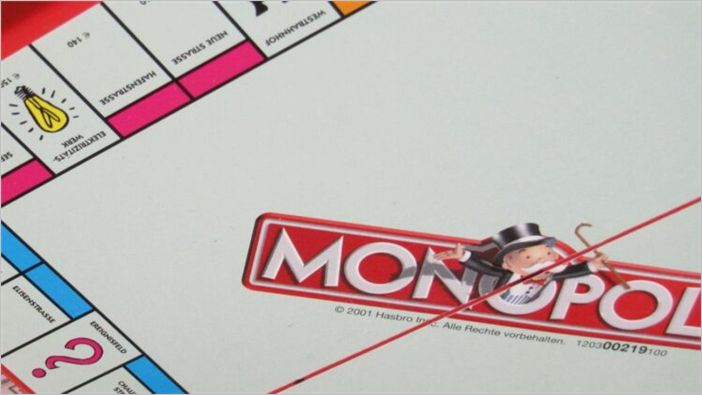
Alright, so you’ve set everything up and now it’s time to have some fun and play Monopoly!
First things first, let’s determine who goes first. Each player will take turns rolling the dice, starting with the banker. The player who rolls the highest total gets to begin the game. To determine this, the player will roll both dice. Remember, the dice have numbers from one to six on them. The player will move their token the same number of spaces as the total shown on the dice. If they roll a 13, for example, they will move their token 13 spaces. Always remember, the tokens can only move in a clockwise direction.
Now, depending on which space your token lands on, you’ll have different opportunities and choices. Here are some things you can do:
- If you land on a property, you can buy it.
- If you land on someone else’s property, you must pay them rent.
- There might be times when you have to pay taxes. So, if you land on a space that tells you to do so, be prepared to pay up.
- There are also Chance Cards and Community Chest Cards that you can draw. These cards will provide you with different instructions and actions to take. You never know what surprises await!
- Finally, here’s one to watch out for – if you land on the space that says “Go to Jail”, you’ll be sent directly to jail. Don’t worry though, you’ll eventually get a chance to get out.
If you roll doubles, you can move your game piece normally and then roll the dice again for a second turn! But be careful not to roll more than two doubles in a row, or you’ll be “caught speeding”! In that case, if you roll doubles three times in a row, you have to move your game piece directly to the Jail space on the Monopoly board.
Once the first player finishes their turn, the player on the left gets to take their turn and roll the dice.
Remember, your game piece has to stay on the space it lands on until your next turn. It’s also possible for two game pieces to be on the same space at the same time.
Now that we understand the basic rules, let’s learn about what each space on the Monopoly board means!
Landing on Go
Did you know that in official Monopoly rules, every time I land on or pass Go, the Banker must pay me $200? That’s pretty sweet, right? But let me tell you about a popular house rule that takes it to the next level. Imagine this: if I land directly on Go and don’t just pass it, I double the amount of money I get. Yup, that’s $400 in my pocket instead of $200. It’s like hitting the jackpot!
But here’s the thing, my friend. Adding this house rule might extend the already lengthy game even further. I mean, who knew that Monopoly could get any longer! So, think twice before introducing this rule, or prepare for an epic gaming marathon.
Now, picture this scenario. I’ve just passed Go, and suddenly, I find myself on a Chance or Community Chest space. And guess what? I draw the “Advance to Go” card! It’s like winning the lottery! Instead of going around the board and collecting money from other players, I skip all that and zoom back to the Go space. And you know what else? I get another $200 (or $400 if we’re playing with the house rule). What a lucky break!
BUYING PROPERTY
Now comes the exciting part! When you land on a property that no one else owns, you have the option to buy it from the Bank at the listed price.
But let’s say you decide not to purchase the property. In that case, the Bank will auction it off to the highest bidder. Anyone, including you, can participate in the bidding. You can start the bidding at any price you choose. The auction will continue until the highest bidder wins the Deed Card for the property and pays the Bank in cash.
PAYING RENT
When you land on a property that someone else owns, they can make you pay rent based on the list printed on the Title Deed card. If they add houses or hotels to their property, the rent goes up.
Make sure to remember to ask for rent when it’s your turn. If you forget and the next player rolls the dice, you won’t get any rent!
The goal is to own all the properties in a color group. That way, you can charge double rent for any properties in that color group that don’t have buildings. This rule still applies even if a property in that group is mortgaged.
HOUSES
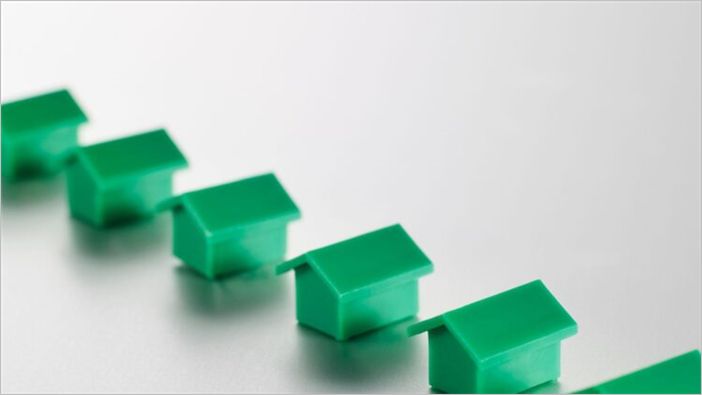
If you want to increase the value of your properties in Monopoly, you can buy houses from the Bank and put them on your properties. Here’s how it works:
First, you need to own all the properties in a color group. Once you have that, you can start buying houses. You can put one house on each property in the color group, up to a maximum of four houses per property. But here’s the catch: if you want to build more than one house on a property, you have to make sure that every property in the color group already has at least one house. And before you can build a third house, each property must have at least two houses. It goes on like that.
The cost of each house is listed on the Deed Card for the property. When you want to sell a house, you can do so back to the Bank for half of the original cost.
When you have four houses on each property of a complete color group in Monopoly, you have the option to purchase a hotel from the Bank. You can then place that hotel on any property within the color group. To do this, you must return the four houses from the chosen property back to the Bank, and pay the hotel price indicated on the Title Deed card. It’s important to note that you can only have one hotel per property.
Hotels are a great way to maximize the rent earned from a property in Monopoly!
WHEN CAN YOU BUY HOUSES IN MONOPOLY?
Once you own a color group in Monopoly, you can add houses or hotels to your properties whenever you want, throughout the game. There is no longer a need to land on a specific space to work on a property. You can even make improvements when it’s not your turn!
SELLING PROPERTY
So, here’s the deal. If you want to make a little extra cash in the game, you can sell some stuff to another player. Now, you can sell unimproved properties, railroads, or utilities to any player, as long as you both agree on a price. But there’s a catch – if there are any buildings on those properties, you can’t sell them. You have to sell the buildings back to the bank first, and then you can sell the property.
Now, when it comes to houses and hotels, you can sell those back to the bank too. But you’ll only get half the original price. Also, you have to sell the houses one by one, starting with the last one you built. Hotels, on the other hand, can be sold all at once, or you can sell them as individual houses. Just remember, one hotel is equal to five houses.
MORTGAGES
In the game, you have the option to mortgage your properties whenever you want, even when it’s not your turn. All you have to do is turn the Deed Card of the property over to the “mortgage” side. Then, the Bank will pay you the mortgage value shown on the card.
There’s one thing to keep in mind: you can only mortgage properties that don’t have any improvements, like houses or hotels. If you have any buildings on the property, you have to sell them to the bank first at half price before you can mortgage it.
Just remember, when you mortgage a property, you won’t be able to collect any rent from it. And the same goes for utilities. However, if you own all the properties of the same color, the ones that aren’t mortgaged can still collect double rent.
If you decide to remove the mortgage from your property, you need to pay the Banker the original mortgage amount plus 10% interest. On the back of the card in newer editions of the board game, you might find the exact amount needed to unmortgage a property.
If you have a mortgaged property, you can sell it to another player for a mutually agreed price. The new owner has the option to immediately remove the mortgage by paying the original mortgage amount plus 10% interest. However, if the new owner postpones lifting the mortgage, they must pay 10% interest to the bank when purchasing the property, and when they eventually decide to remove the mortgage, they must pay the original mortgage amount plus 10% interest.
Let’s say, for instance, the mortgage is $100. To lift the mortgage right away, you would need to pay $110. However, if a player buys the mortgaged property and doesn’t immediately remove the mortgage, they will have to pay a total of $120 in a future turn.
CHANCE AND COMMUNITY CHEST
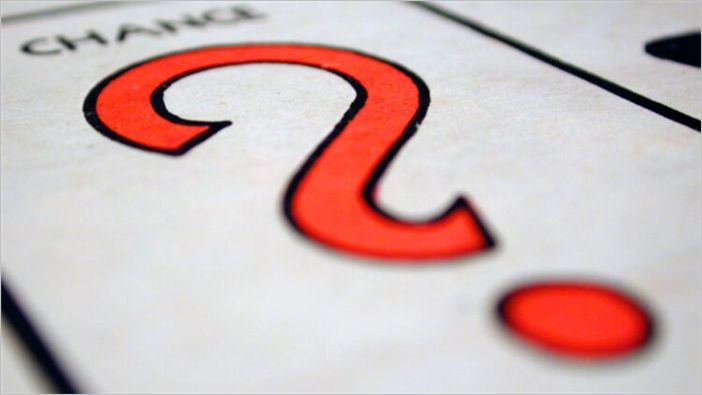
When you land on either of these spaces, you have to pick a card from the deck. Do what it says, and then put the card back at the bottom of the deck.
If you draw the “Get Out of Jail Free” card, keep it until you can use it. But if you don’t want it, you can sell it to another player.
INCOME TAX
If you land on an Income Tax space, you have two choices:
- You can estimate your tax at $200 and pay the Bank.
- You can pay 10% of everything you own to the Bank.
What’s your total worth? This includes:
- All the money you have
- The prices of your properties – both mortgaged and not mortgaged
What does it mean to be a homeowner?
When I became a homeowner, I discovered a whole new world. It’s not just about having a place to live; it’s about having a home to call your own. As a homeowner, I take pride in the fact that I have something that is truly mine.
Responsibility
Being a homeowner comes with great responsibility. It’s not just about paying the mortgage and property taxes; it’s about taking care of your home. From routine maintenance like mowing the lawn and cleaning the gutters to handling repairs when things go wrong, there’s always something that needs attention.
But with responsibility comes a sense of accomplishment. Knowing that I am capable of taking care of my own home gives me a sense of pride and satisfaction. I become more resourceful and learn new skills along the way, making me a more well-rounded individual.
Freedom
Owning a home also comes with a sense of freedom. No longer am I bound by rules and restrictions set by a landlord. I can paint the walls any color I want, hang pictures wherever I please, and make changes to the layout of my home to better suit my needs.
Having the freedom to make my home truly reflect my personality and preferences is empowering. It allows me to create a space that feels like me, where I can relax and be myself.
Investment
One of the key benefits of homeownership is the potential for financial gain. Unlike renting, where every monthly payment goes towards someone else’s investment, owning a home allows me to build equity of my own. As the value of my property increases over time, so does my net worth.
Additionally, owning a home provides stability and security. I don’t have to worry about sudden rent increases or the possibility of having to move at a moment’s notice. I have a place that I can always call home, and that brings me peace of mind.
Jail
Being a homeowner does come with its challenges, though. One of them is the financial commitment. It’s important to carefully consider the costs involved and ensure that you have a solid financial plan in place.
Homeownership may also mean sacrificing some flexibility. Unlike renting, where you can easily move to a different location, owning a home ties you down to a specific place. It’s a commitment that requires careful thought and consideration.
Nevertheless, the rewards of homeownership far outweigh the challenges. It’s a journey of personal growth, freedom, and financial security. So, if you’re thinking about becoming a homeowner, embrace the adventure and discover the joys of having a place to call your own.
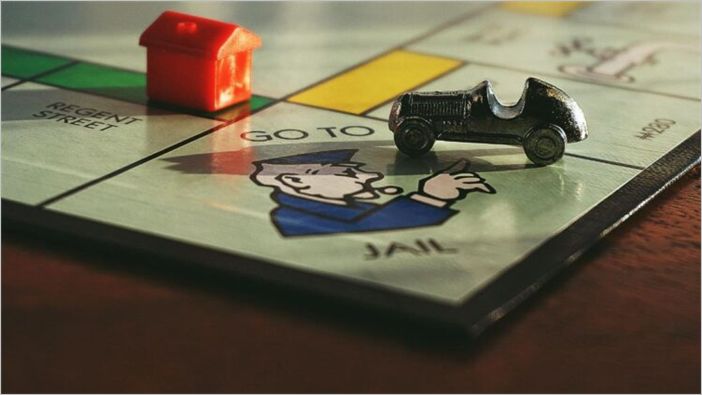
Jail is like a corner space on a Monopoly board. When you’re in Jail, you can’t take your turn until one of these things happens:
1. You roll a double.
2. You pay $50 to get out.
3. You use a Get Out of Jail Free card.
But here’s the thing: if you just land on the Jail space, you’re not actually in Jail. You’re just visiting.
So, how do you end up in Jail? Well, there are a few ways:
1. If your token lands on the space that says “GO TO JAIL.”
2. If you draw a Chance card or Community Chest card that says “GO (DIRECTLY) TO JAIL.”
3. If you roll doubles three times in a row in one turn.
When you go to Jail, you don’t pass Go and you don’t collect $200. You go straight to Jail in the special “In Jail” section of the Jail space.
But don’t worry, you can get out of Jail early if you do one of these things:
1. Roll a double.
2. Pay $50.
3. Use a Get Out of Jail Free card.
So, Jail is kind of a tricky place to be in Monopoly, but it’s all part of the game!
Strategies to Get Out of Jail in Monopoly
In the game of Monopoly, getting sent to jail can be a frustrating setback. But don’t worry, there are several ways to get out and continue playing! Here are some strategies you can use:
- Rolling doubles on any of your next 3 turns. If you’re lucky enough to roll doubles, you can move forward the number of spaces shown on the dice. But remember, you only get one chance to roll again.
- Using a “Get Out of Jail Free” card. If you have this card, you can use it to immediately move your token to the “Just Visiting” area and roll the dice to keep playing.
- Paying the $50 fine before rolling. If you’re willing to part with some of your hard-earned cash, you can pay the fine and continue with your turn.
Collecting Rent in Jail
Even though you’re in jail, you can still collect rent from other players. And that’s not all – you can also buy and sell properties and buildings while in jail. This means that strategically, it might be a good idea to get yourself sent to jail on purpose to avoid landing on other players’ properties. Just remember that you can only stay in jail for a maximum of three turns!
Free Parking
Another interesting aspect of the game is Free Parking. Although it doesn’t have a direct purpose according to the official rules, some players choose to house special rules in which money collected from fines or other sources is placed in the center of the board and awarded to the first player who lands on Free Parking. This adds an extra level of excitement and strategy to the game!
Hey there! Did you know that the official rules of Monopoly say that when you land on Free Parking, it’s just a place for you to take a break? Yep, it doesn’t give you any money or rewards. You just hang out there until your next turn.
But here’s a cool house rule that many people play with: whenever someone has to pay fees or taxes, that money goes right into the middle of the board instead of the Bank. And guess what? If you’re lucky enough to land on Free Parking, you get to collect all that money! Sounds fun, right? Just remember, this house rule can make the game last even longer.
BANKRUPTCY
Now, let me tell you about bankruptcy. It happens when you owe more money than you can pay to another player or the Bank. Maybe you don’t have enough cash or you don’t have any properties to trade or sell. Either way, if you’re bankrupt, it means you’re out of the game. It’s a tough spot to be in, so try to avoid it!
If you owe money to another player, you have to give them all your money and properties and leave the game. If you have any houses or hotels, you have to give them back to the Bank and you only get half of what they’re worth. The money you give back goes to the player you owe.
You can also give mortgaged properties to the player you owe, but the new owner has to pay 10% of the value of the mortgage to the bank. Then, the new owner can decide to unmortgage the property or keep it as is. If they choose to keep it as is, they have to pay the mortgage value plus an extra 10% as interest.
If, on the other hand, you find yourself owing more money to the Bank than you can afford to repay, you’re in a tough spot. In this situation, you’ll have to surrender all your assets to the Bank. You won’t even be able to hold onto any buildings you might own, as they’ll be immediately taken away. The Bank will then sell off all the properties at an auction, giving other players a chance to snag them.
GAME OVER
As the game progresses, players will inevitably go bankrupt and drop out. Eventually, only one player will be left standing with any money. And that lucky person will be declared the winner of the game!
ADDING SOME SPICE TO THE GAME
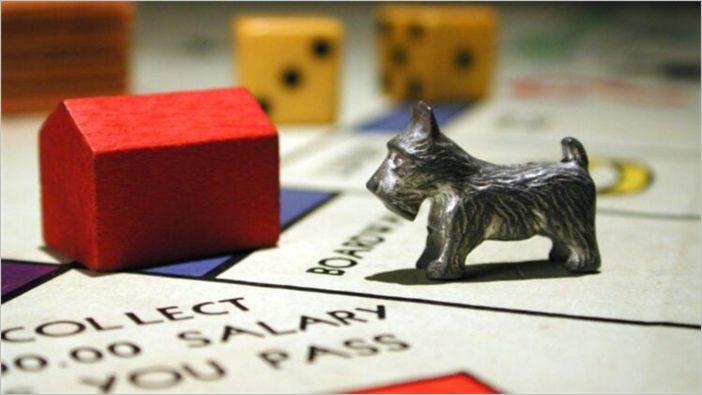
When it comes to playing Monopoly, following the official rules is the way to go. But if you’re feeling adventurous, you can add some house rules to make the game more exciting. These house rules have been created by players over time, and you can pick and choose the ones you like to create your own unique version of Monopoly.
FREE PARKING
One of the most popular house rules is the “Free Parking” rule. As we mentioned earlier, this rule states that all the money collected from taxes and fees goes into a pot in the middle of the board. And when a player lands on the “Free Parking” space, they get to collect all the money in that pot.
This house rule adds a fun twist to the game by introducing a lottery-like element. It gives players a chance to receive unexpected cash that can completely change the game, especially if a significant amount of money accumulates in the pot.
LANDING ON GO
When you land on the GO space in Monopoly, there’s a popular house rule that allows you to collect double the usual income. Instead of receiving $200, you get $400 if your token lands directly on GO and doesn’t pass it on your turn.
PROPERTY DEALING
Here’s an interesting twist: at the beginning of the game, all the property is evenly distributed among the players. This means there’s no rush to buy property and plenty of money to develop your properties. While this speeds up the game, it also removes some of the skill and the satisfaction of building a successful monopoly through strategic property acquisition.
BUILDING RULES
Hey there! Let’s talk about the different rules for building houses and hotels in Monopoly. It can get a little confusing, but don’t worry, I’ll break it down for you.
According to the official rules, there’s a specific way you have to build houses. You need to own all the properties in a color group before you can start building houses. And not just that, each property in the group needs to have the same number of houses.
But here’s the cool part – in some versions of the game, you can build houses however you want! That means you can have one property with four houses, while another property in the same group has just one or maybe even none at all. It’s like having your own creative freedom!
And guess what? Some versions even throw the whole color group rule out the window. Yep, you heard that right. In these versions, you can build houses on any property you own, no matter the color. It gives you a lot more flexibility and strategy.
Different Monopoly Editions
When I think about Monopoly, the first thing that comes to mind is its immense popularity. It’s no wonder that this board game has so many different versions around the world.
Let me share with you some exciting editions of Monopoly that you might find interesting:
- Monopoly The Mega Edition
- Monopoly Deal
- Monopoly Junior
- Monopoly Builder
- Monopoly Friends The TV Series Edition
- Monopoly Animal Crossing New Horizons Edition
- Monopoly Disney Villains Henchmen Edition
- Monopoly Pixar Edition
- Monopoly Junior Super Mario Edition
- Monopoly Travel World Tour
- Monopoly National Parks 2020 Edition
- Monopoly The Super Mario Bros. Movie Edition
- Monopoly Barbie Edition
- Monopoly The Card Game
- Monopoly Diced
Hey there! I wanted to let you know about some other cool versions of Monopoly. In addition to the classic Monopoly board game, there’s Monopoly: The Card Game, Monopoly Diced, and Monopoly Deal. You should definitely check them out!
MONOPOLY TOURNAMENTS
Did you know that there are Monopoly tournaments? Hasbro, the official Monopoly website, sometimes shares information about upcoming tournaments. These tournaments are a big deal and bring together Monopoly players from around the world!
The World Championship Monopoly Tournaments are held every four to six years, and the past tournaments took place in 1996, 2000, 2004, 2009, and 2015. Unfortunately, there was supposed to be a tournament in 2021, but it got canceled because of the COVID-19 pandemic.
There are also national championships that happen around the same time as the World Championships or the year before. If you’re interested in participating in these tournaments, you can find more information on the official Hasbro website. It’s a great opportunity to show off your Monopoly skills and compete with players from all over!
Did you know that besides the official tournaments, other organizations can hold Monopoly tournaments as fundraisers? It’s true, but they need permission from Hasbro. Hasbro has some specific rules that they require you to follow if you want to host a tournament. Fortunately, you can easily apply for permission by submitting a form through email.
Frequently Asked Questions
How Long Does a Game of Monopoly Take?
Typically, a game of Monopoly lasts anywhere from 30 minutes to 3 hours. Most games fall in the range of 60 to 90 minutes.
Can Monopoly Be Played with Two Players?
Absolutely! Monopoly can be played with as few as two players and as many as eight players.
Do You Collect Rent While in Jail?
No need to fret! Even when you’re in jail, you’re still technically participating in the game. This means you can collect rent from other players and engage in buying, selling, or trading properties.
Can You Borrow Money From Other Players?
Hey there! So, guess what? I’ve got some interesting news for you about borrowing money in the game of Monopoly. According to the official rules, borrowing money or property from other players is a big no-no. Sorry, but you can’t count on your friends for a quick loan during the game! However, don’t fret just yet. There is still a way to get some cash when you’re in a bind. You can mortgage your properties to the Bank and borrow money from there. Pretty nifty, right?
What Happens If I Run Out of Houses?
Have you ever wondered what to do when you run out of houses in Monopoly? Well, I’ve got the scoop for you. Here’s the deal: if the Bank runs out of houses, you’ll have to be a bit patient if you want to build more. You’ll need to wait until another player returns or sells their houses before you can get your hands on some new ones. It’s like waiting in line for a popular ride at an amusement park. Hang in there, though, and soon enough you’ll be able to build to your heart’s content!
Hey, by the way, let me introduce myself. I’m a digital nomad and a traveler who has this crazy love for board games. And guess what? Word games are my absolute favorite! I just can’t get enough of games like Scrabble, Boggle, and of course, Wordle, too! They’re a blast! So, if you’re into word games like me, I have a feeling we’re going to get along just great. Who knows, we might even end up having a friendly game night together sometime!